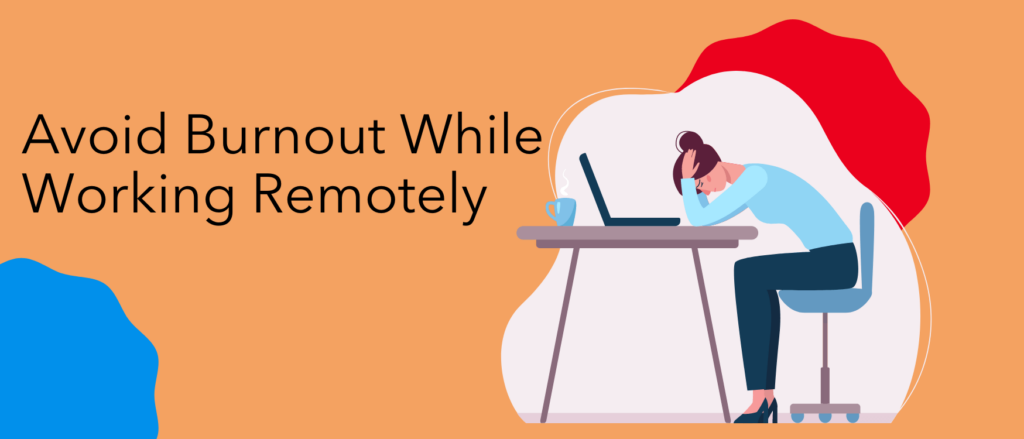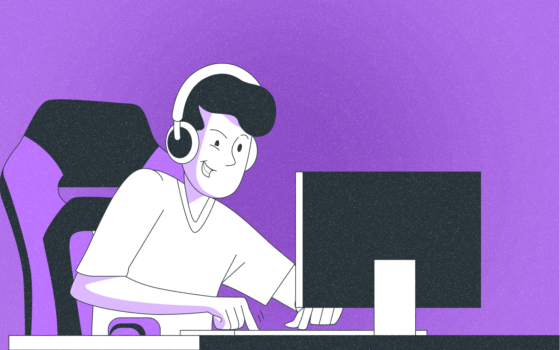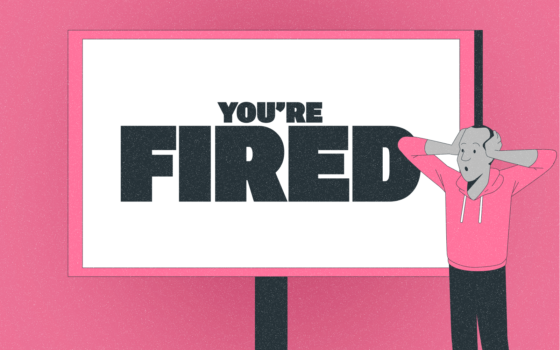How to Avoid Burnout While Working Remotely: 20 Ways to Keep a Healthy Work/Life Balance


The recent covid pandemic has familiarised us with the term ‘burnout’ and remote work. With the sudden spread of a worldwide pandemic in 2020, even those who were not believers in the power of remote work had no choice but to join. Now, we are familiar with and feel comfortable working remotely.
Working remotely has many challenges, but with the right tools, you can avoid burnout. Most recently we experienced a massive change in how people work; maybe it is time for your career path? Check out these 20 helpful tips on creating a healthy balance between personal and office life while working from home! A little effort goes a long way when trying not only to stay sane throughout this hustle but also to be productive with whatever task may captivate us most today: whether that be writing code or raising kids.
Some Statistics on Employee Burnout
Have you ever felt burnt out? I’m not talking about the sunburn kind of burning, but rather an inner sense that everything is too much for you to handle. It can be difficult enough when your work life feels like one big hustle with no breaks in between. The General Medical Council’s survey showed that in the United Kingdom, 24% of trainees and 21% of trainers feel burnt out to a high or very-high degree because of their work. People choose to work remotely because of a better work-life balance.
- According to this research, about one-third of physicians are feeling burned out at any one moment.
- 16% of the organizations in the world allow 100% remote work.
- 44% of companies do not offer remote work options.
- 77% of remote workers show more productivity when they work from home.
What Is Employee Burnout?
In simpler words, we can say that employee burnout is a state of physical, emotional, and mental exhaustion caused by excessive and prolonged stress. It occurs when an individual feels overwhelmed, emotionally drained, and unable to meet constant demands. As the stress continues, they begin to lose interest in their work and feel detached from their colleagues. Burnout syndrome is a condition that has not been effectively managed due to continuous work stress. It has three dimensions, which are feelings of exhaustion or energy depletion, feelings of negativity related to one’s job, and reduced work-related efficacy.
What Causes Employee Burnout? 6 Major Causes:
There are many causes of employee burnout, but the most common one is lack of control. When an individual feels like they have no control over their work or their work environment, it can lead to a sense of powerlessness. This can be caused by several factors, such as:
- unrealistic deadlines
- excessive workload
- conflicting demands
- lack of support from management or colleagues
- lack of resources
- unclear expectations
1. Unrealistic Deadlines:
If your immediate supervisor asks you to meet unrealistic deadlines, you should genuinely say “No”. Because, if you do not meet unrealistic deadlines, you face burnout that will eat all your productivity and motivation. In addition, if you’re constantly being given deadlines that are impossible to meet, it can lead to a sense of powerlessness and frustration.
2. Excessive Workload:
If you have an excessive workload you will feel overwhelmed and stressed. This can be caused by several factors, such as taking on too many projects, having unrealistic deadlines, or working long hours. The best way to avoid this is to manage your time effectively and learn to say “no” to new projects.
3. Conflicting Demands:
It is very important to maintain a work-life balance. When you are constantly pulled in different directions, it can be difficult to find time for yourself. This can lead to feelings of guilt, resentment, and even burnout. To avoid this, try to set boundaries with your work and stick to them.
4. Lack of Support from Management:
If you feel like you are not supported by your company, it can be very discouraging. This can lead to a feeling of isolation and can even make you question your decision to work remotely. The best way to avoid this is to stay connected with your team and management. Keep the lines of communication open and let them know how you are feeling.
5. Lack of Resources:
If you feel like you don’t have the resources you need to do your job, it can be very frustrating. For example, if you do not have a good internet connection, it will frustrate you and lead to burnout. This can also lead to a feeling of being overwhelmed and can even make you question your decision to work remotely. The best way to avoid this is to stay organized and efficient. Make sure you have everything you need before you start working on a project.
6. Unclear Expectations:
“If you expect nothing from somebody you are never disappointed,” says Sylvia Plath. Keep that in mind. It does not mean that you or your supervisor should never expect anything. But, the main thing is that the expectations should be clear and reasonable. If the expectations are not clear, it can lead to frustration and burnout.
The best way to avoid this is to have a clear understanding of what is expected of you and to communicate with your supervisor if something is unclear.
I hope you understood the term “employee burnout” and its causes. We will discuss the 20 ways to avoid burnout later. But, it seems good to read about work-life balance first.
What Is A Work-Life Balance?
Work-life balance is when you have a healthy mix of work and personal time. This can be difficult to achieve, especially if you work long hours or have a family. The best way to achieve a work-life balance is to set boundaries between your work and personal life. For example, you can set office hours and stick to them. This will help you have time for your personal life without sacrificing your work.
Work-life balance is important because it can help you avoid burnout. When you have a healthy balance, you are less likely to feel overwhelmed or stressed. This can help you be more productive and efficient at work.
20 Ways to Keep a Healthy Work/Life Balance
There are numerous ways you can keep a healthy work/life balance. Here are 20:
1. Setting Boundaries:
Why are deadlines crucial for remote employees? Deadlines should be the same whether it is a remote work or work office space. When you work from home, you do not have your immediate supervisor to keep an eye on you, thus you will get distracted and ultimately face workload and subsequent burnout. Set boundaries with your family and friends. Just because you are home does not mean you are available 24/7. Let your loved ones know when you are working and when you are free, so they can respect your time and space. This will help your personal and work-life balance.
2. Creating A Dedicated Work Space:
A dedicated workspace means that you should have a separate area at your house where you will work with all of your office stuff there. If possible, do find a room in your house that can be used as an office. This will help you to “go to work” and “leave work” at the end of the day, which can be crucial for maintaining a healthy work/life balance.
You might have noticed that it seems odd to open your laptop in bed or at the kitchen table; it just does not feel like a workspace. Creating a designated work area will help you get into ”work mode” as soon as you sit down.
3. Taking Breaks
Many of us work as if we are a robot. It damages our health and personal life. Make sure to take breaks. It may seem counterintuitive, but taking regular breaks can make you more productive in the long run. Get up and walk around for a few minutes, or make yourself a cup of tea – anything to take your mind off work for a few minutes. You’ll come back refreshed and ready to tackle whatever is on your plate.
4. Making a Schedule And Sticking To It
When you work remotely, it can be easy to let work bleed into the rest of your life. To avoid this, make a schedule and stick to it as best as you can. Dedicate certain hours of the day to work, and make sure you take breaks and weekends off. This will help you maintain a healthy work/life balance and prevent burnout.
5. Get Up and Move Around Every Few Hours
Sitting in one position for hours on end is not only bad for your health, but it can also make you more likely to burn out. To avoid this, make sure to get up and move around every few hours. Take a walk, do some stretches, or just get up and pace around your house – anything to get your blood flowing and your body moving.
6. Drink Plenty of Water
H. Auden rightly says, “Thousands have lived without love, not one without water.” When you are working, it is easy to forget to drink water and eat healthy food. But if you want to avoid burnout, it is important to take care of your body. Make sure to drink plenty of water throughout the day, and take breaks to eat healthy meals and snacks. This will help you maintain your energy levels and avoid burnout.
7. Avoid Working When You Are Tired or Sick
Never work like a robot. Your health must be your priority. If you are feeling exhausted, it is important to take a break and rest. Trying to push through when you are tired will only make you less productive. The same goes for when you are sick. It is better to take a day off to recover than try to work through your illness and end up making yourself feel much worse.
8. Stay Organized By Using Folders and Calendars:
One of the best ways to avoid burnout is to stay organized. This can be done by using folders and calendars to keep track of your work. Having a system in place will help you stay on top of your workload and prevent you from feeling overwhelmed.
Folders can be used to store different types of files such as project proposals, client information, and meeting notes. You can also use them to create sub-folders for each stage of a project. This will help you keep track of where you are in a project and what still needs to be done.
Calendars can be used to track deadlines, meetings, and appointments. They can also be used to plan your workweek. By mapping out your time, you can avoid overbooking yourself and prevent burnout.
9. Make Time For Yourself
To avoid burnout, it’s important to make time for yourself. This can be done by setting aside time each day to do something that you enjoy. Whether it’s reading, going for a walk, or taking a yoga class, carving out time for yourself will help you relax and recharge.
It’s also important to take vacations. By taking a break from work, you’ll come back feeling refreshed and ready to take on your next project.
10. Excercise Regularly
Exercise is a great way to reduce stress and improve your overall health. It’s important to find an exercise routine that you enjoy and make time for it in your schedule. Exercise can be anything from going for a run to taking a dance class.
Whatever you choose, make sure that you’re getting at least 30 minutes of exercise each day.
11. Get Enough Sleep
Sleep is essential for good health and well-being. It’s important to get at least seven hours of sleep each night. If you’re having trouble sleeping, there are a few things you can do to improve your sleep habits.
The benefits of sleep are more than just physical. You’ll be less prone to burnout when you get enough rest, which is important for being productive in your work life as well. Make sure that for 7-8 hours each night you go into a deep slumber with no interruptions or distractions.
Some tips include: avoiding caffeine before bed, establishing a regular sleep schedule, and creating a relaxing bedtime routine.
12. Connect With Friends and Family
When you feel isolated, it is important to reach out and make contact with friends or family. Social interaction can help reduce stress levels while also improving your mood. If that is not possible for some reason (or if they are too far away), there are plenty of ways online where we will still be able to stay connected despite the physical distance.
13. Take Vacations and Weekends off To Relax
Make sure to schedule some time for you and your family. Although it may be tempting to work all the time when you have the flexibility, it’s important to take some time off to relax. This will help prevent burnout and allow you to come back to work refreshed and ready to be productive.
14. Find a Hobby Outside of Work
One of the best ways to avoid burnout is to have a hobby that you are passionate about. When you have something to look forward to outside of work, you will be less likely to feel burnt out by your job.
Find an activity that you enjoy and make time for it in your schedule. Hobbies can be anything from playing a musical instrument to hiking. You can go walking in the evening after you finish your work, but remember to leave your mobile phone at home.
15. Reduce Social Media Use
If you find yourself mindlessly scrolling through social media when you should be working, it might be time to cut back. Social media can be a huge time suck, and it can also be detrimental to your mental health. If you find that you’re using social media as a way to procrastinate, try setting a limit for yourself. For example, you might allow yourself to check social media for 15 minutes at the start of the day and 15 minutes at the end of the day. Or, you might only allow yourself to use social media on certain days of the week.
16. Eat Healthy Food
The best way to stay energized and focused while you’re working is by eating healthy food like fruits, vegetables, and whole grains. It will help keep your body running smoothly. You should also try to avoid processed foods, sugary drinks, and excessive amounts of caffeine.
17. Avoid Caffeine Before Bedtime
Caffeine is a strong stimulant that can keep you awake at night and make it difficult to fall asleep. If this happens, avoid drinking caffeine in the evening and opt for herbal tea instead.
18. Limit Alcohol Consumption
Caffeine and alcohol both can keep you awake when consumed excessively, but they also differ greatly in how much harm their consumption causes. One shot of espresso will give most people more energy than a glass of wine. However, alcohol causes long-term liver damage which will take a very negative toll on all aspects of your life
19. Make Time for Personal Interests
Having interests outside of work will help you relax and recharge. Make sure to schedule some time each week to pursue what you enjoy.
Read that book you bought a while ago, and go to that play your friend suggested. Make Friday night a movie marathon. Do what interests you.
20. Seek Professional Help if Needed
Last but not least, if you are struggling to manage your stress, seek professional help. A therapist can help you develop coping mechanisms and deal with any underlying issues that may be contributing to your stress. Remember, it’s okay to ask for help when you need it.
Working remotely can be a great way to increase your productivity and give you more personal time. However, it’s important to avoid burnout by maintaining a healthy work/life balance. Use these tips to make sure you stay healthy and happy while working remotely.


